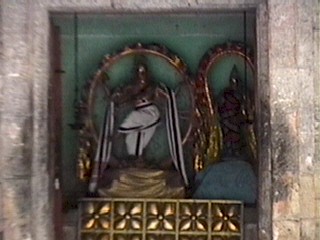While, the non-anthropomorphic Lingam form of Shiva, is primarily held in
worship in all Saivite temples, the iconic forms or archa murthys of Shiva have been
carved in stone (in the devakosthas or niches - and in temple towers and panels), and
frozen in metal and held in worship for centuries together.
The earliest examples of these carvings
are from the Elephanta and
the Ellora caves in Maharashtra
of the Gupta period, Badami, Aihole in Andhra Pradesh and Karnataka, Mahabalipuram and
other Pallava sites in Tamilnadu, Chamba and Bhramour in North India.
The best specimen of these images are
seen from the Chola period of the earlier portion of the 2nd millennium CE. Also to be
mentioned are the fine bronzes which also date back to the same period.

The commonly seen iconic representations
of Shiva are Nataraja, Somaskanda, Chandrasekhara, Bhikshatana, Dakshinamurthy,
Lingodbhava, Sukhasanamurthy, Vaivahikamurthy, Uma Maheswara, Rishabharuda, Tripurantaka,
Harihara (or the Shiva Vishnu manifestation), Ardhanareeswara (the
Shiva-Shakti manifestation), Chandesanugrahamurthy (Shiva blessing
Chandikeswara), Kaalasamhaaramurthy and Sadasiva.
